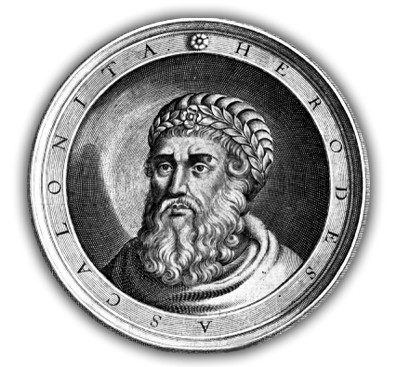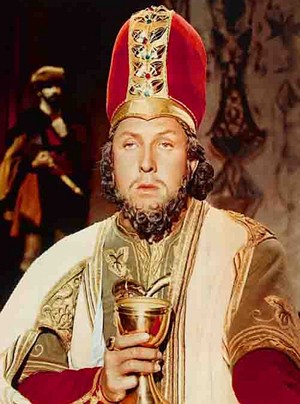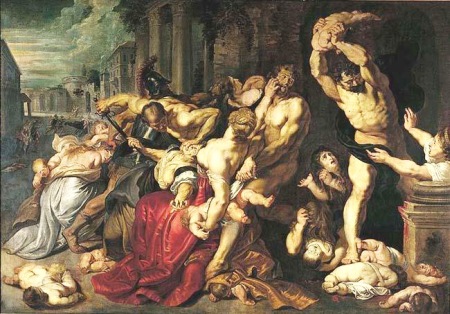|

The Murder of The
Innocents
A view of
Herod the Great
 A particularly nasty
tyrant. Ruler from 37BC to 4BC of the kingdom of Judea
(consisting mostly of Jerusalem and present-day southern
Israel), Herod's paranoia about keeping power and his
ruthless suppression of dissent earns him a well
deserved place alongside the great dictators and
criminals of history. A particularly nasty
tyrant. Ruler from 37BC to 4BC of the kingdom of Judea
(consisting mostly of Jerusalem and present-day southern
Israel), Herod's paranoia about keeping power and his
ruthless suppression of dissent earns him a well
deserved place alongside the great dictators and
criminals of history.
Brutal
Bastard: Herod killed many of his people. He trusted no
one, not even his wives (of which he had ten) or his
many sons. One spouse and three of his boys were all
executed because he feared they were plotting against
him. Any threat of an uprising was put down with brutal
and bloody ferocity. Encouraged by his Roman masters,
Herod believed in singling out individuals for public
execution as well as the mass slaughter of opponents.
But his most brutal act of genocide - the so-called
Murder of the Innocents, recorded in St Matthew's Gospel
- was to order the killing of every single male child
under two in his kingdom in an effort to destroy the
infant Jesus, lest he grow into another threat to
Herod's rule. It has inspired some of the most lurid
scenes in recent Hollywood biblical epics, with Herod's
soldiers beating out the brains of babies and running
others through with their swords. Simply being a member
of Herod's family did not guarantee safety.
He married Mariamne, a princess of the deposed Hasmonean
royal family, in order to secure his rule - despite
already having a wife. Later, convinced that Mariamne
was being unfaithful, he hatched a plot to have her
murdered. Once she found out, she stopped sleeping with
her husband, who saw this as evidence of her infidelity
and put her on trial for adultery. Herod's anger soon
dissipated and, convinced that she had been faithful
after all, his affections were rekindled. However, this
came too late as Mariamne had already been executed. Her
mother Alexandra, who had supported Herod in the trial
of his queen, was repaid by being the next to be
dispatched, for suggesting that he was unfit to rule.
Herod governed by consent of the Roman emperors whose
dominion stretched over most of the eastern
Mediterranean and down to Egypt, under Cleopatra. They
regarded Herod as a useful puppet king, able to keep the
often rebellious Israelites in order. They were not too
interested in his methods, though the Emperor Augustus
was reported to have said: 'It is better to be Herod's
dog than one of his children.'
 What prompted the remark was the pile of corpses of
Herod's family that grew in the courtyard of his palace.
In 35BC, he had his brother-in-law, the High Priest Aristobulus, drowned because he suspected him of
disloyalty. Another brother-in-law, Kostobar, was killed
soon afterwards. His sons by Mariamne, Alexandros and
Aristobulus, were both killed on his orders. Another
son, Antipas, was executed for treason. What prompted the remark was the pile of corpses of
Herod's family that grew in the courtyard of his palace.
In 35BC, he had his brother-in-law, the High Priest Aristobulus, drowned because he suspected him of
disloyalty. Another brother-in-law, Kostobar, was killed
soon afterwards. His sons by Mariamne, Alexandros and
Aristobulus, were both killed on his orders. Another
son, Antipas, was executed for treason.
It is not hard to see why, for many Jews, the
much-married Herod was a hated figure.
But his crimes extended beyond his brutality and lack of
morals. He came to symbolise their subjugation to Rome.
When he placed a golden eagle, the emblem of Roman rule,
on the gateway into the Jewish temple, the holiest of
holies, he faced an uprising, again put down with much
bloodshed.
The Jewish historian Josephus Flavius, in his
first-century accounts History Of The Jewish War and The
Antiquities Of The Jews, gave a
glimpse of Herod's
methods. He also describes how Herod died a painful
death from chronic kidney disease and gangrene in 4BC at
the age of 70. However, if this account is accurate, it
poses a tricky dilemma for the Christian Church. How did
this tyrant manage to order the murder of young children
to prevent Jesus growing to adulthood a full four years
before Jesus was actually born?
Now when
Jesus was born in Bethlehem of Judea in the days of
Herod the king, behold, wise men came from the east
to Jerusalem, saying, Where is He who is born king
of the Jews? For we have seen His star in the east
and have come to worship Him. But when Herod the
king heard these things, he was troubled, and all
Jerusalem with him. And when he had gathered all the
chief priests and scribes of the people together, he
demanded of them where Christ should be born. And
they said to him, In Bethlehem of Judea. For so it
is written by the prophet, "And you, Bethlehem, in
the land of Judah, are not the least among the
governors of Judah. For out of you shall come a
Governor who shall rule My people Israel."
Then Herod, when he had secretly called the wise
men, inquired of them exactly what time the star
appeared. And he sent them to Bethlehem, and said,
Go and search diligently for the young child. And
when you have found him, bring me word again so that
I may come and worship him also. When they had heard
the king, they departed. And lo, the star which they
saw in the east went before them until it came and
stood over where the child was. And seeing the star,
they rejoiced with exceedingly great joy. And coming
into the house, they saw the child with Mary His
mother. And they fell down and worshiped Him.
And opening their treasures, they presented gifts to
Him, gold and frankincense and myrrh. And being
warned of God in a dream that they should not return
to Herod, they departed into their own country
another way. And when they had departed, behold, the
angel of the Lord appeared to Joseph in a dream,
saying, Arise and take the young child and His
mother and flee into Egypt. And be there until I
bring you word, for Herod is about to seek the child
to destroy Him. And he arose and took the young
child and his mother by night and departed into
Egypt. And he was there until the death of Herod; so
that it might be fulfilled which was spoken by the
LORD through the prophet, "Out of Egypt I have
called My Son."
Then Herod, when he saw that he was mocked by the
wise men, was greatly enraged. And he sent and
killed all the boys in Bethlehem, and in all its
districts, from two years old and under, according
to the time which he had carefully inquired of the
wise men. Then was fulfilled that which was spoken
by Jeremiah the prophet, saying, "A voice was heard
in Ramah, wailing and weeping and great mourning,
Rachel weeping for her children, and would not be
comforted, because they are not." (Matt 2:1-18)

The killing of hundreds of babies can never be
depicted in its reality.
We can only imagine the terror
and Mean Herod's wicked smile.
|
